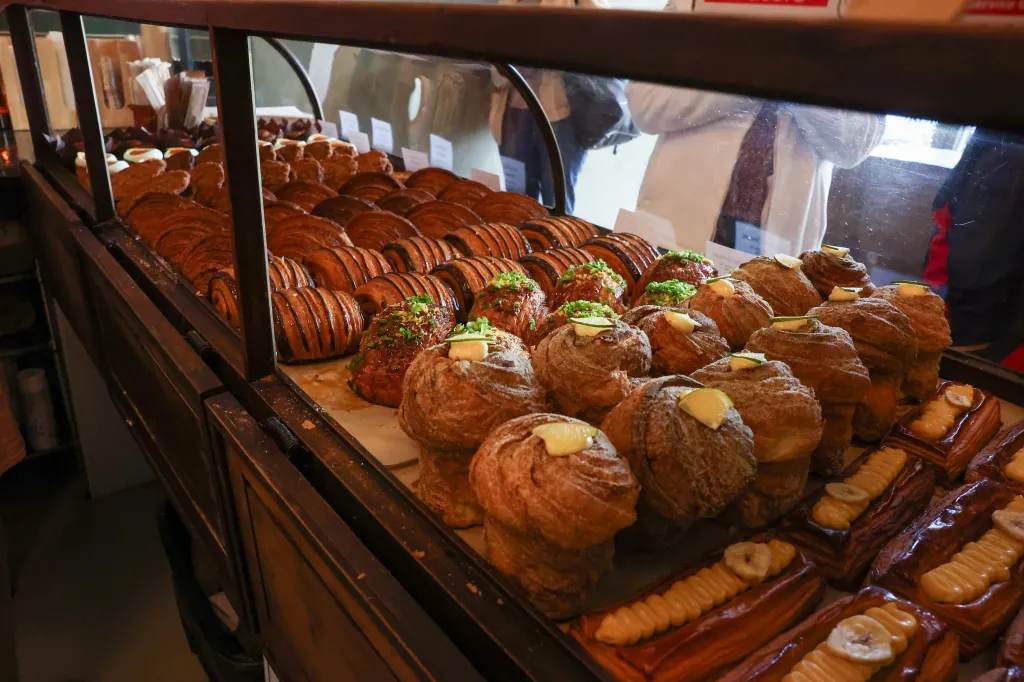Copyright Chicago Tribune

Del Sur Bakery in Chicago makes extraordinary and eccentric pastries artfully layering the Philippines with the Midwest, but pastry chef and prodigy Justin Lerias doesn’t quite realize their edible works are comparable to the best in the world. Lerias opened his hyperseasonal farm-to-pastry-box debut in the Lincoln Square neighborhood in March. If the bakery seems like a stunning, fully formed vision, he might share that it’s been his dream since high school. But he just graduated in 2020. The chef has also never had formal pastry training. Instead, while still at Senn High School, he worked weekends at a bakery known for its creative croissants. But the student deliberately never learned to laminate. “The lamination always scared me,” said Lerias about the sorcery behind layering butter and dough. “I avoided it for the entirety of my time at Lost Larson.” His pivotal moment came when he lost that job in the early pandemic closures. “I was like, OK, I think it’s time for me to actually learn how to laminate,” said Lerias, so he taught himself at home. “And I came up with those first two pastries in the middle of COVID.” Those pastries — his turon Danish and longganisa croissant — became bestsellers at pop-ups, still sell out daily at the bakery and will become part of his lore. The turon Danish, slender and elegant, meant to echo memories of the fried Filipino snack, shatters into buttery shards, revealing a delicate layer of deeply caramelized banana jam beneath a luminous ribbon of softly sweet vanilla flan. “The flan part was the one thing that I was struggling with for a bit,” Lerias said. “I’m not just gonna slice a rectangle of flan and flop it on there, because that seems sloppy for me.” So he blended it into a beautiful pipeable custard. And that’s not any flan. It’s a recipe from his mother, Merle Tiu Lerias. The longganisa croissant, however, may be her favorite. “My mom loves longganisa,” the chef said. He and his team make their own Filipino sausage, unusual for restaurants, even more so at a small bakery for croissants. “She gets them a lot.” He rolls his toasted rice laminated dough around a hunk of spiced pork sausage, before baking and then finishing with a sticky soy sauce caramel, umami-rich cured egg yolks curls and sharp green scallions. It’s an outrageously savory and hearty crackling pastry. “It’s like a flavor punch,” Lerias said. “A lot of our processes at the bakery, I like to call vibes-based baking, because we don’t have a lot of recipes.” Not rigorously tested, but something more. “I always tell my staff, at the end of the day, if you still have the same product, bake with your heart,” he added. “And I think that’s part of why the pastries have been so popular.” Their pretty and precise gâteau Basque is his personal favorite. “In terms of eating,” Lerias said. “I love the Basque cake the most.” Dainty yet delightfully dense, topped by a gorgeously grassy ring of slightly salted pandan cream, it’s inset with a crown jewel of seasonal jam. I had a radiant peach, ripe yet brilliantly bright. That will have changed when you go to what’s currently in season from Seedling or Mick Klug farms. Del Sur’s bibingka, a gloriously chewy gluten-free brown butter coconut rice cake filled with cream cheese and guava jam, is the Filipino cousin to the Basque cake. Do note it’s baked in pandan leaves, which are not edible. A calamansi chamomile bun, maybe one of my favorites after tasting everything on the menu, stands tall and tender with a silky curd core capturing the tart and elusive calamansi. It’s clearly a cross between a croissant and muffin, as invented by Lune Croissanterie in Australia. The food for the gods muffin was christened after the curiously named traditional Filipino holiday date and walnut bar. But Del Sur is nut-free and this pastry is vegan. A lovely spelt sourdough crumb holds a date caramel swirl and toasted pumpkin seeds instead. A pumpkin seed croissant is his opulent take on the French almond croissant. He begins with that toasted rice laminated dough, baked and then loaded with a pumpkin seed frangipane, salted pandan syrup, pandan cream and more toasted pumpkin seeds. The bakery remains nut-free for a very personal reason. When Lerias was in high school, he had a very dear friend who died suddenly, he said, after a nut allergy reaction at a restaurant. “I tried being very subtle about it,” he said about their nut-free status. “But the next thing you know, people were posting about us on nut-free forums.” The toasted rice croissant is made with Midwest-grown wild rice as well as Asian forbidden black rice, painstakingly layered into laminated dough. “There’s so much labor that goes into that croissant, which people just do not see,” said Lerias. “And, why would they?” They think it’s gluten-free, but it’s not, he said, and often pass on it “because it’s a plain croissant.” Let me be clear, there’s nothing plain about a great butter croissant. And this great croissant starts with cooking wild and forbidden rice that’s then dehydrated, toasted dark, pulverized into powder, cooked again into a porridge paste and finally folded into the dough. “We’ve probably done at least 20 different recipes,” said the chef. “And it just keeps getting better.” The croissant’s layers lift impeccably from within, but all that labor does get lost and doesn’t come through in the flavor. I wonder why there’s not a suggestive garnish. Maybe some toasted rice? “Months leading up to the opening of the bakery, we did garnish it,” said Lerias. “We dusted it with toasted rice sugar and did a toasted rice syrup.” But he chose to keep it simple. “Our pastries are so eccentric,” said the chef. “I wanted a pastry for people who will come into the bakery and just say, ‘Hey, I want the most basic one.’” The pain au chocolat is terrific, but surprisingly restrained with a single dark chocolate baton, enhanced by a subtle espresso cardamom glaze. An adobo brownie with a bay leaf-infused batter, soy caramel and lime zest garnish beautifully balances between cakey and fudgy, yet doesn’t deliver the promised flavors of the iconic Filipino dish. An ube oatmeal cream pie sandwiches huge brown butter oatmeal cookies with salted ube buttercream, but falls somewhat flat, especially evident in the filling. A rotating special buchi latte listed sesame and red bean, as found in its namesake fried glutinous rice snack, but was particularly disappointing at an $8 cup. The house-made chai, however, pours intense flavors with Volition tea and a house spice blend. “I knew that I wanted to make our own chai blend,” said Lerias, from his experience selling pastries at Side Practice Coffee. “And one of my baristas, DeeDee Krupkin, said she had a really good recipe.” They refined it further with rose water and orange extract. Then, about three months ago, the chef thought there must be something they could do with the spent yet still aromatic tea and spices. The chai roll is the sustainable pastry he’d envisioned. They dehydrate and toast the spent chai blend, mix it with butter and sugar, then spread that into a dough made from croissant scraps. Finished with orange zest, it’s an unassuming yet powerful pastry conjuring cinnamon roll strolls among autumnal leaves. A daily seasonal vegetable sandwich, which Lerias credits to head baker Jesse Lee, previously at Publican Quality Bread, recently highlighted supple beets and baby kale in a sublime seeded ciabatta. Do note that sandwiches are not available until 11 or 11:30 a.m. when the daily bread is usually ready. A seasonal kaldereta galette, with the Filipino beef stew interpreted as an open-faced Midwestern pot pie, was bountiful and breathtaking. “That was not my idea,” said Lerias. “That was one of my baristas, their name is Oliver Caldwell.” Everyone in the bakery is encouraged and supported, said the chef, in whatever ideas they have. “I get so emotional thinking about this,” he added. “With Oliver coming into the kitchen, and all the bakers huddling together and being like OK, what can we do to make this Del Sur?” Together, they added a fennel salad dressed with a calamansi vinaigrette. Del Sur Bakery was directly inspired by his story as an immigrant. Lerias emigrated from the Philippines to Chicago at 14. “Del Sur is named after the region I’m from,” said the chef. “In the south, called Zamboanga del Sur.” He grew up in a middle-class family, very supportive of his endeavors. “Filipino kitchens are not equipped with ovens,” he added. “So when I told my mom I wanted to learn how to bake, she immediately got me an oven.” Lerias began by baking cake mixes for his father around 10. “I was under the care of my grandma and my dad at the time,” he said. His mother had immigrated to Chicago by then. “I moved here to join my mom, who was already here working.” As much as Lerias wanted to stay in the Philippines, he believed that to become a pastry chef, moving to the U.S. was the better option. But he’s not only a pastry chef. He also makes the striking and sculptural floral arrangements at the bakery. They set the organic modern mood for the space. The experience of waiting in line is a bit like walking a Zen meditation labyrinth. But instead of enlightenment or cucumber water, you’re rewarded with pastries. The service staff, led by general manager Kristina Mathews, previously at Allez Café, will guide you gently through your immediate life choices. The boxes, designed by creative director and brand manager Maria Meade, look and feel expensive, unlike any other pastry packaging around the city. “I felt guilty for only doing to-go,” said Lerias. “And if we’re making people wait in line, then we better make sure it’s worth their wait.” But his lines, which were so long when they opened that people became friends, were short when I visited twice, first thing on a weekday morning and later on an afternoon. “Thursday and Friday, there’s barely a line,” said the chef. “Saturday, it’s still a little crazy, maybe 30 to 45 minutes in line. Sunday, it’s hit or miss, but the line has improved, and that is what we want.” They’re always looking for ways to ensure the customer’s well-being is prioritized, and that includes a sit-down café next door. “We’re looking at summer next year,” said Lerias. He’s also excited to have a space where people can do pop-ups. Meanwhile, his mother already cries when she’s at the bakery. “My mom had a restaurant in the Philippines, so I definitely got my cooking abilities from her,” said her son. She closed it when he was young. “I can’t imagine having to give up a successful restaurant to go to a different country,” said Lerias. “Now, seeing your son open up his own food business.” “Yeah, it’s hard.” Del Sur Bakery & Café 4639 N. Damen Ave. delsurchicago.com Open: Thursday to Sunday 8 a.m. to 3 p.m. Prices: $8 (turon Danish), $10 (longganisa croissant), $6.75 (pandan Basque cake), $8.50 (calamansi chamomile bun), $7.50 (pumpkin seed croissant), $9 (seasonal kaldereta galette), $6 (hot or iced house-made chai) Sound: OK (60 to 65 dB) Accessibility: Wheelchair accessible by ramp available upon request from staff onsite; no public restrooms Tribune rating: Excellent to outstanding, 3.5 of 4 stars Ratings key: Four stars, outstanding; three stars, excellent; two stars, very good; one star, good; no stars, unsatisfactory. Meals are paid for by the Tribune. lchu@chicagotribune.com



